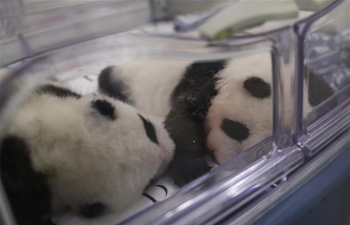CHICAGO, Oct. 3 (Xinhua) -- Momentary increases in mothers' sensitivity to their toddlers' cues and emotional needs may boost young children's focused attention on tasks and positive engagement with their mother while lowering the children's expressions of negative emotions, a study posted on the website of the University of Illinois (UI) on Thursday shows.
UI researchers observed 64 pairs of mothers and their toddlers, who ranged in age from 18 months to just over 3 years, while they played with toys, read a picture book and shared a snack.
"The mothers and their children also participated in some more challenging situations that were aimed to elicit frustration, anger or other negative emotions," said lead author Xi Chen, a graduate student in human development and family studies.
In one situation, the child was approached by a mechanical toy dog that barked unpredictably; in another scenario, the child tried to retrieve a toy from a locked transparent box using a key that didn't work.
The mothers, who were seated about 3 feet from their children during the challenging tasks, were told to respond to their child's behavior in whatever way felt natural.
Using video recording, independent teams observed and tracked the mothers' and children's behaviors and interactions in 60-second intervals across all of the tasks for about 50 minutes. The team observing the mothers noted how quickly and effectively the mothers responded to their child's signals of distress, such as soothing them when they cried.
They also noted whether the mother responded in supportive, child-centered ways when their child became interested in a toy.
Another team of observers tracked the children's behavior, including their sustained interest in the various tasks and their positive engagement with their mother, such as showing her toys, asking for help or responding when she initiated play.
The children's expressions of positive and negative emotions, such as smiling, laughing, crying or whining, were recorded. Toddlers who are lower in temperamental pleasure are less likely to smile when they're being cuddled or rocked.
Mothers and fathers completed portions of a child temperament questionnaire that measured the child's tendencies to show anger or frustration when his or her goals were blocked, as well as their expressions of pleasure and positive emotions during every-day routines such as bathing, bedtime or play.
UI researchers tracked each mother's responsiveness to their child across the various tasks, calculated her average level of responsiveness and examined how momentary fluctuations in it correlated with the child's behavior at the same moment.
When the mom showed greater sensitivity than was typical for her, children who were lower in temperamental pleasure showed significant increases in their ability to focus on the task at those times.
However, children who were high in temperamental pleasure stayed focused on the task regardless of fluctuations in their mothers' sensitivity.
The researchers said the effects of temperamental pleasure found in the study support the buffering hypothesis, the notion that having a positive disposition buffers children from mild stressors such as dips in parental sensitivity and may help children cope with frustration and actively explore the world around them.
The study has been published in the Journal of Family Psychology.













